In honor of Veterans Day, we asked military veterans now part of the team at Radiology Partners, “How has your military service prepared you for your current career serving patients?”
There is truly no thank you great enough, but we hope sharing a few stories will help to honor their service.
We spoke with Dr. Anand Singh, a musculoskeletal radiologist, about his service with the Air Force and how it relates to his work today caring for patients.
See more of the meaningful stories below from our teammates. Their service continues through their work to provide the best care to patients and families.
On this Veterans Day, thank you to all veterans for the brave, selfless sacrifices you have made and continue to make for all of us.
Chris Baxley, Vice President, Strategic Partnerships
 At RP, I am responsible for leading the development and growth of RP’s partnerships with larger health systems. There are many lessons that I carry from my time as an artillery officer in the U.S. Army to my current role.
At RP, I am responsible for leading the development and growth of RP’s partnerships with larger health systems. There are many lessons that I carry from my time as an artillery officer in the U.S. Army to my current role.
- In the military, and especially in a military at war, complexity is a constant: Problems don’t often come neatly packaged with boilerplate solutions. It is reliant on the teams who face those challenges to sort through that complexity, to understand root causality and to address complex issues by breaking them down into smaller simpler solutions. While the context is different, the complexity is still very much a part of our day-to-day in the dealings we have with health systems, and it still requires the same approach.
- Gathering intel before taking action: It is tempting when building health system relationships with an eye toward expanding our partnerships to go in chasing every lead we can find. Doing this will, in many instances, create issues for RP within these health systems’ own political bureaucracies. Understanding the political, decision-making and power landscape within health systems before we make big mistakes is critical to our success.
- Perspective: One of the greatest gifts my time in the military has afforded me is a healthy perspective. When conversations get tense with a partner, a Friday evening flight home gets delayed four hours or the meeting you’ve worked so hard to arrange gets canceled, it’s helpful to remind yourself that no one is shooting at you and you’re going to eat. Your family is hours or days away and not months away, and your colleagues are all going to make it home to their families too. A hardship forgotten is a wasted gift.”
Clayton Bozeman, Authorization Referral Representative Lead
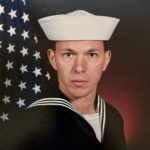 “My first exposure to working in a medical setting came during the Persian Gulf War. My Seabee reserve unit, Naval Mobile Construction Battalion 24, provided support to Fleet Hospital 5, the first fully functional field hospital in the theater. To me, RP’s ITESA principles represent a fine-tuning of similar principles inherent in military culture, which emphasizes teamwork among people from many diverse backgrounds; provides service to subordinates, superiors and the country as a whole; and incorporates personal and group-level integrity and accountability to ensure excellence. These, along with the old Seabees’s “Can Do!” ethic, are an excellent basis for any human endeavor but especially so for the critical functions of healthcare.”
“My first exposure to working in a medical setting came during the Persian Gulf War. My Seabee reserve unit, Naval Mobile Construction Battalion 24, provided support to Fleet Hospital 5, the first fully functional field hospital in the theater. To me, RP’s ITESA principles represent a fine-tuning of similar principles inherent in military culture, which emphasizes teamwork among people from many diverse backgrounds; provides service to subordinates, superiors and the country as a whole; and incorporates personal and group-level integrity and accountability to ensure excellence. These, along with the old Seabees’s “Can Do!” ethic, are an excellent basis for any human endeavor but especially so for the critical functions of healthcare.”
Dr. Steven Ciabattoni, Teleradiologist
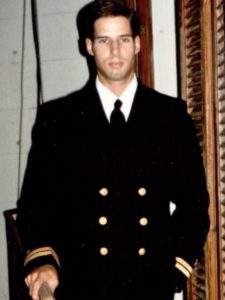 “I was in the U.S. Navy Reserves during my medical school and residency years from 1983 to the late 90s. I was on active duty the day after I finished my residency at New York University from 1992-1996. I was stationed at the U.S. Naval Hospital in Naples, Italy during my entire active duty, and it was an amazing and wonderful experience. My first month at the Naval Hospital, a pregnant patient in her third trimester came for her first ultrasound. Imagine my shock when I saw the fetal head against the under surface of the mother’s liver. Yes, it was a live third trimester ectopic pregnancy. Thankfully, the mother and baby survived but nearly used all of the units of blood in southern Italy during the surgery. That experience as well as many more during my military service was invaluable and helped prepare me for my the rest of my radiology career, which since 2006 has been with Nighthawk and vRad.”
“I was in the U.S. Navy Reserves during my medical school and residency years from 1983 to the late 90s. I was on active duty the day after I finished my residency at New York University from 1992-1996. I was stationed at the U.S. Naval Hospital in Naples, Italy during my entire active duty, and it was an amazing and wonderful experience. My first month at the Naval Hospital, a pregnant patient in her third trimester came for her first ultrasound. Imagine my shock when I saw the fetal head against the under surface of the mother’s liver. Yes, it was a live third trimester ectopic pregnancy. Thankfully, the mother and baby survived but nearly used all of the units of blood in southern Italy during the surgery. That experience as well as many more during my military service was invaluable and helped prepare me for my the rest of my radiology career, which since 2006 has been with Nighthawk and vRad.”
Temple Gordon, CT Technologist
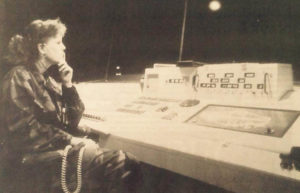 “As I think back to my experience as an air traffic controller in the U.S. Air Force during Desert Storm, I realize that was the most challenging and scariest time in my life. I did my best every single day to keep my brothers and sisters safe. Today, decades later, I continue to give my very best effort to care for my patients and keep them safe. It was a privilege to serve my country.”
“As I think back to my experience as an air traffic controller in the U.S. Air Force during Desert Storm, I realize that was the most challenging and scariest time in my life. I did my best every single day to keep my brothers and sisters safe. Today, decades later, I continue to give my very best effort to care for my patients and keep them safe. It was a privilege to serve my country.”
Roddney Hackstall, Senior Project Manager
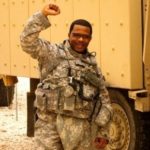 I proudly served 20 years in the U.S. Army and served in leadership roles for more than half of my tenure. I have managed teams of up to 360 people, with well more than 90 million in assets. When I decided to retire, I leaned on my project management experience and certifications. Today, I serve as a Senior Project Manager for the practice, leading healthcare implementations for a variety of health systems.”
I proudly served 20 years in the U.S. Army and served in leadership roles for more than half of my tenure. I have managed teams of up to 360 people, with well more than 90 million in assets. When I decided to retire, I leaned on my project management experience and certifications. Today, I serve as a Senior Project Manager for the practice, leading healthcare implementations for a variety of health systems.”
Josh Kipnis, Vice President, Operations and Integrations
Ernest Morgan, Nuclear Medicine Technologist
Moving into civilian life, I used my military background along with my degree from the University of Alabama to enroll in nursing school at the University of Alabama at Birmingham. Civilian nursing was not like what I had come to enjoy as a Medic in the Air Force, so I explored options in Allied Health professions at Birmingham Baptist Medical Centers and began my rotations in medical imaging, obtaining my registry in radiography in 1977. While at Vanderbilt University Medical Center, I obtained my registry in nuclear medicine in 1978.
Having been a member of the armed forces, there are valuable lessons that can be learned beginning with basic training in any branch of the military. The military molds the individual into a member of a team and that team functions as a single unit, with various levels of leadership. Discipline and respect are cornerstones to establishing trust and dependability that can make good things happen against all odds. With such training, integrity is developed, teamwork results in excellence, appreciation for service is recognized and accountability grows with maturity.”
Dr. Stephen Sabo, Diagnostic Radiologist
It’s called military service appropriately. You don’t sign up just because they pay the most, because they do not. You have the opportunity to serve your country and learn some valuable lessons in the process.
- You may not appreciate the person or their personality, but you must respect their rank.
- All interactions are based on rank, regardless of what the people look like.
- There is always a common experience between all service members based on their training.
- 15 minutes early is on time.
- Embrace the concept of “hurry up and wait” or be constantly miserable.
- Take all the additional training that is offered. If you stop learning and advancing in rank, your military career will end. That is true for both enlisted and officers.
- Basically, if you can tolerate a military environment, you are well-prepared to deal with any modern business or healthcare system. I found my military service enlightening and useful.”
Dr. Anand Singh, Musculoskeletal Radiologist
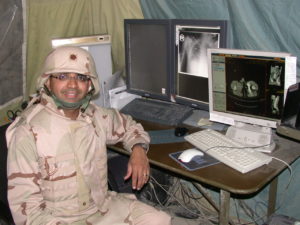 “The choppers came in low at nighttime, one after another, thundering to their landing pads carrying mass casualties from places far and wide. At the same time, the sirens blared overhead, and we knew that we were also under a simultaneous mortar attack from insurgents perched in the hills just outside the walls of the base.
“The choppers came in low at nighttime, one after another, thundering to their landing pads carrying mass casualties from places far and wide. At the same time, the sirens blared overhead, and we knew that we were also under a simultaneous mortar attack from insurgents perched in the hills just outside the walls of the base.
It was the summer of 2006 and the height of the insurgency in Iraq. I was stationed at Balad Air Force Base just outside of Baghdad as a combat radiologist at the largest wartime forward combat hospital in U.S. history. Danger was palpable at that moment, as our lives were literally at stake from the enemy fire. But more importantly, we knew that our patients’ lives were in the balance if we did not band together to do what was needed to stabilize the wounded.
Instead of panic, we purposefully tended to the sick and worked as a unit to make sure every patient, active duty and civilian, received the best of our care. We knew that our core military values such as teamwork and service to our fellow humans helped us achieve our mission that day in the face of daunting odds.
That same spirit carries me forward to this day in my career at RP where I am surrounded again by teammates who embody similar core values in the spirit of quality patient care. I am thankful for the lessons learned during my career in the Air Force and proud that I work in an organization that shares that same ethos.”
Radiology Partners is a leading physician-led and physician-owned radiology practice in the U.S. Learn more about our mission, values and practice principles at RadPartners.com. For the latest news from RP, follow along our blog and on Twitter, LinkedIn, Instagram and YouTube.






